
- Subject:
- Political Science
- Social Science
- Material Type:
- Unit of Study
- Provider:
- Rice University
- Provider Set:
- OpenStax College


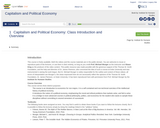
This course is an introduction to economics for non-majors and political economy, with an emphasis on the moral and ethical problems that markets solve, and fail to solve. Taught by Professor Michael Munger of Duke University, this course includes full length lectures, links to readings, and a sample final exam.
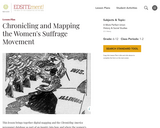
This lesson brings together digital mapping and the Chronicling America newspaper database as part of an inquiry into how and where the women's suffrage movement took place in the United States. Primary source newspaper articles published between 1911-1920 and maps from 1918-1920 are used to prompt student research into how women organized, the type of elections that women could participate in, and the extent to which the 19th Amendment transformed voting rights in the U.S.
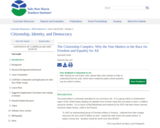
Not all people are born equal or free but there is an expectation of both when you are a citizen of the United States. Our struggles to earn the base level of representation are quickly forgotten as we look for another group to demonize. In my unit we will discover why George Washington was ahead of his time with his warning about "factions" and how their existence makes freedom and equality harder to bridge. As we trek through time highlighting issues such as the abolition of slavery, support for women's suffrage, and the challenges that face Asian and LGBTQIA communities my hope is that student understand the sacrifices made to be accepted and to earn the right to vote but more importantly the difficulty in being welcomed into American society.
The “Citizenship Complex” is the process by which groups gain full inclusion. To understand it, one must look to the intersection of law, citizenship and the Constitution. The unit aims to provide a more complex history of our nation, to tell a more earnest story of how the American identity became a mosaic of human struggle, and to offer a more robust and enlightening study of these issues so that as students recognize the power of citizenship they will take a more hopeful view of what our nation will look like in the future. By engaging in the sophisticated discussions of the past, identifying why some groups supported each other and scapegoated others, and learning about the importance of supporting efforts at inclusion, our students should become more informed, open-minded, and ready for the globalized world of the 21 st Century.
The unit will focus on four groups that have experienced the “Citizenship Complex”: African-American slaves, women, Asian immigrants, and the LGBTQIA community. By comparing these groups over time, we will really be able to unearth the cycles behind the Citizenship Complex and understand that American citizenship means at different times in our country’s history.

Do you think that a majority vote is always the fairest way to reach a consensus? Think again! In this video, Professor Diana Thomas of Creighton University explains that it is very easy for a savvy politician to dictate the winner of a vote using Condorcet’s Paradox.

Foundations and philosophical applications of Bayesian decision theory, game theory and theory of collective choice. Why should degrees of belief be probabilities? Is it always rational to maximize expected utility? If so, why and what is its utility? What is a solution to a game? What does a game-theoretic solution concept such as Nash equilibrium say about how rational players will, or should, act in a game? How are the values and the actions of groups, institutions and societies related to the values and actions of the individuals that constitute them?
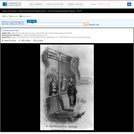
The artist satirizes the split in party loyalties between the Locofoco and Tammany factions of New York City Democrats. In particular he belittles the Irish immigrants widely recruited by the party at the time. The print may have apeared during the elections of 1836. An Irishman stands on a platform before two booths, one marked "Tammany Committee" and the other "Locofoco Committee," and says, "As I'm a hindependent Helector, I means to give my Vote according to conscience and him as Tips most!" Beyond the platform is a crowd of voters, one holding a sign "Vote for Hoxie" (Joseph Hoxie, a prominent figure in New York Whig politics).|Pubd. by H.R. Robinson, 52 Cortlandt St. N.Y.|Signed: N. Sarony (Napoleon Sarony).|Title appears as it is written on the item.|Weitenkampf, p. 47.|Forms part of: American cartoon print filing series (Library of Congress)|Published in: American political prints, 1766-1876 / Bernard F. Reilly. Boston : G.K. Hall, 1991, entry 1836-20.

This lesson allows students to listen to a podcast and check out different links to learn more about political parties, how and why they developed, along with learning key vocabulary terms. There are several options within the lesson, including working with a partner, creating a word cloud, reading an article, watching documentary clips and a clip from the musical Hamilton, and completing a graphic organizer. It also includes information and materials where students can learn more about the major presidential elections of 1800, 1824 and 1860.

This course is premised on the belief that emotions are a fundamental part of human nature. Accordingly, understanding emotions and incorporating emotions into our research can help us better explain variation in important political phenomena. Research on emotions and how emotions can influence decision-making has dramatically increased over the past two decades. This class aims to pick up on new findings from psychology and other disciplines and marshal this knowledge toward the most important issues of political science.
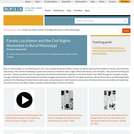
This collection uses primary sources to explore Fannie Lou Hamer and the civil rights movement in rural Mississippi. Digital Public Library of America Primary Source Sets are designed to help students develop their critical thinking skills and draw diverse material from libraries, archives, and museums across the United States. Each set includes an overview, ten to fifteen primary sources, links to related resources, and a teaching guide. These sets were created and reviewed by the teachers on the DPLA's Education Advisory Committee.
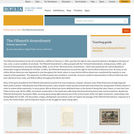
This collection uses primary sources to explore the Fifteenth Amendment. Digital Public Library of America Primary Source Sets are designed to help students develop their critical thinking skills and draw diverse material from libraries, archives, and museums across the United States. Each set includes an overview, ten to fifteen primary sources, links to related resources, and a teaching guide. These sets were created and reviewed by the teachers on the DPLA's Education Advisory Committee.

This course examines the definition of gender in scientific, societal, and historical contexts. It explores how gender influences state formation and the work of the state, what role gender plays in imperialism and in the welfare state, the ever-present relationship between gender and war, and different states' regulation of the body in gendered ways at different times. It also investigates new directions in the study of gender as historians, anthropologists and others have taken on this fascinating set of problems. Students taking the graduate version complete additional assignments.

The topic of Gerrymandering can be a difficult one to teach and get students to understand. This lesson includes several options, along with additional resources and information for the new teacher or a teacher who like many Americans may have trouble grasping and explaining gerrymandering and congressional redistricting. The lesson options include having students engage in a Debate and/or activity where they draw or redraw the boundaries of a state or congressional district.

This graduate-level course focuses on mass political behavior within the American political system. The goal of this course is to give an introduction to some of the major questions in the study of American political behavior, and how people have gone about answering them. The background goal is to help students practice reading work critically, and thinking through the difficulties of social science research, in preparation for individual research projects. The course examines political ideology, public opinion, voting behavior, media effects, racial attitudes, mass-elite relations, and opinion-policy linkages.

This seminar will explore the difficulties of getting agreement on global definitions of sustainability; in particularly building international support for efforts to combat climate change created by greenhouse gas emissions as well as other international resource management efforts. We will focus on possible changes in the way global environmental agreements are formulated and implemented, especially on ways of shifting from the current "pollution control" approach to combating climate change to a more comprehensive strategy for taking advantage of sustainable development opportunities.
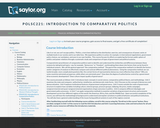
Comparative politics is the systematic study and comparison of the world's political systems. The course begins by discussing the factors and categories of analysis that political scientists and important international institutions like the World Bank, NATO, and the United Nations use regularly; it ends by comparing and contrasting governments from five different regions of the world: the Americas, Europe, Africa, Asia, and the Middle East. Upon successful completion of this course, students will be able to: Define the chief characteristics of a nation state; Identify and explain various comparative methodologies used to compare various political systems; Distinguish between unitary, federal, and confederal governmental models; Compare and contrast political cultures in selected countries; Compare and contrast political socialization in selected countries; Describe and explain patterns of representation and participation in selected countries; Compare and contrast the roles and functions of political parties in selected countries; Compare and contrast the role of interest groups in selected countries; Identify and explain governance and policy-making in selected countries; Compare and contrast the role of the executive in selected countries; Compare and contrast the role of the judicial branch in selected countries; Compare and contrast the role of the bureaucracy and the policy process in selected countries; Describe and explain the political economy and development in selected countries; Identify and explain political challenges and changing agendas in selected countries. (Political Science 221)

This course is intended as an introduction to the field of political economy. It is the first part of a two-part sequence in political economy, along with 14.773 Political Economy: Institutions and Development. Combined, the purpose of the two classes is to give you both a sense of the frontier research topics and a good command of the tools in the area.

This class introduces students to innovative as well as classic approaches to studying U.S. government. The writing assignments will help you explore, through a variety of lenses, statis and change in the American political system over the last three decades. In the end each student will have a solid grounding in our national political institutions and processes, sharper reading and writing skills, and insight into approaching politics critically and analytically.
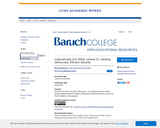
Lecture #21 for the course: CS 3550: Cybersecurity - "Hacking Democracy: Election Security". Delivered at Baruch College in Spring 2020 by Michael Whiteman as part of the Tech-in-Residence Corps program.